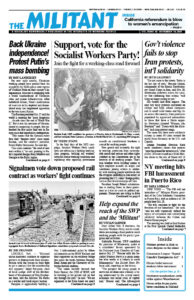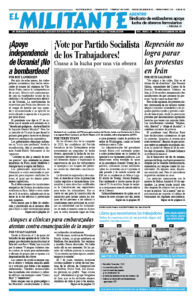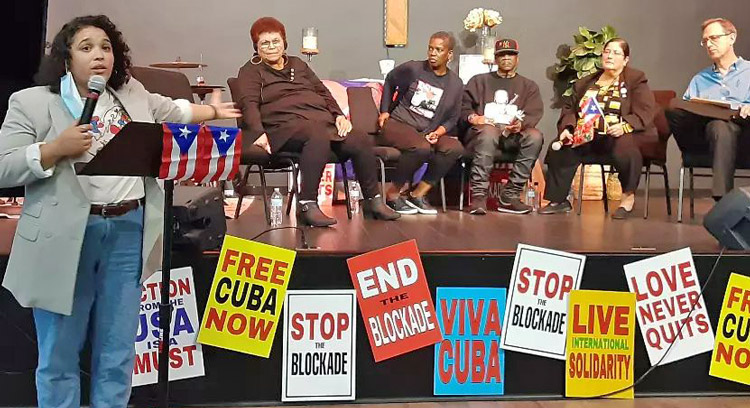NEW YORK — “The FBI will not intimidate us!” Milagros Rivera, president of the Cuba Solidarity Committee in Puerto Rico, told an audience of 120 people here Oct. 28.
“We will continue to fight for the freedom of our homeland,” she said, “and we will vigorously defend the legacy of reciprocal and centurylong solidarity between the Cuban and Puerto Rican people.”
The meeting was held in East Harlem at the First Spanish United Methodist Church — also known as the People’s Church. Rivera spoke as part of a panel discussion organized to educate about and protest FBI harassment of 62 people in the U.S. colony of Puerto Rico, mostly participants in the Juan Rius Rivera Brigade, which visited Cuba in July. The FBI has also harassed at least six Cuba solidarity activists in the U.S.
The event was sponsored by the People’s Church and co-sponsored by eight Puerto Rican pro-independence organizations, including the Frente Independentista Boricua, together with IFCO/Pastors for Peace, Casa de las Américas, Socialist Workers Party, African People’s Socialist Party, and the New York-New Jersey Cuba Sí Coalition.
Rev. Dorlimar Lebrón chaired the event. “Solidarity is being criminalized,” she said in welcoming participants to her church and introducing the panel. “Today we are having an important conversation about what it means to stand for what we believe without fear and intimidation.”
FBI is U.S. ‘political police’
“The FBI is the political police of the U.S. government, used to maintain the imperial order,” Rivera said. She recalled the long history of FBI attacks on the pro-independence movement.
The activities of the annual solidarity brigade to Cuba are public and completely legal, Rivera noted. This year participants met with members of Cuban mass organizations to learn more about the revolution and discuss with Cubans the fight to end U.S. colonial rule in Puerto Rico. They also brought medical supplies to help overcome shortages caused by Washington’s economic war on Cuba.
In Havana the brigade joined a public meeting featuring the Cuban Five, Cuban revolutionaries who were framed up and spent up to 16 years in U.S. prisons. There they also met Cuban President Miguel Díaz-Canel, and were joined by their compatriot, Oscar López, who was imprisoned by Washington for nearly 36 years for actions in defense of Puerto Rico’s independence. That meeting “must have quite upset the imperialists,” Rivera said with a smile.
At the end of August, FBI agents began to visit and call brigade members in Puerto Rico. They claimed the brigade violated a federal law, “but never said which one,” Rivera said. They alleged that the brigade “was infiltrated by Cuban security agents, and other such nonsense,” she noted. Some FBI agents “did not even want to identify themselves.” They were trying “to criminalize travel to Cuba and solidarity,” she said.
The solidarity committee immediately made the FBI harassment public and explained that no one should speak to the FBI, she said.
Importance of solidarity
Rivera underlined the importance of the broad support received by the brigade. She said the Militant newspaper, which sent a reporting team to San Juan within days of learning about the FBI harassment, helped to “keep the protests alive.” The FBI hasn’t contacted anyone in Puerto Rico since the end of August but we have to be prepared, she said, given its history of frame-ups.
We are going to continue the struggle to “end this U.S. criminal blockade against Cuba,” Rivera said. The committee has announced that its 32nd brigade will go to Santiago de Cuba next July 26 to celebrate the 70th anniversary of the opening of the Cuban Revolution, as well as to mark the 125th anniversary of the U.S. colonial invasion of Puerto Rico.
Also speaking on the panel, Gail Walker, executive director of the Interreligious Foundation for Community Organization, noted that after IFCO was formed in 1967 it was investigated by the FBI. In 2016 the IRS revoked the group’s tax-exempt status. IFCO fought back, won support, and regained its status.
It’s possible to push back government harassment if we “stand in solidarity with each other,” Walker said.
On July 29, FBI agents broke down the doors of offices and homes of members of the African People’s Socialist Party and Uhuru in St. Louis and St. Petersburg, Florida. They set off flash-bang grenades, and temporarily detained leaders of the group at gunpoint, slandering them as “unregistered foreign agents” of Moscow. The cops confiscated computers, cellphones and financial records.
The FBI raid happened under the administration “of President Joseph Biden and Vice President Kamala Harris,” said panelist Oronde Lumumba Shakur from the African People’s Socialist Party. He noted both Democrats and Republicans serve the interests of the U.S. capitalist rulers.
Speaking for the Frente Independentista Boricua, Ana López, a professor at Hostos Community College, reviewed the long history of FBI attacks on the Puerto Rican independence movement. The FBI was key to railroading Pedro Albizu Campos, a central leader of the Nationalist Party of Puerto Rico, to prison in 1937. It was Albizu Campos, she said, who established the principle that independence fighters “don’t cooperate with Yankee imperialism and its agencies.”
Martín Koppel, speaking for the Socialist Workers Party, explained that as Washington prepared to enter World War II, President Franklin Roosevelt signed an executive decree that transformed the FBI into a federal political police that immediately began to target the labor movement. Using the thought-control Smith Act, the government railroaded to prison 18 members of the SWP and the Teamsters union.
In 1973 the SWP filed a lawsuit against the FBI and other federal cop agencies. Combined with a public campaign, it helped expose the Cointelpro operations that targeted the SWP, Communist Party, Black rights groups, Puerto Rican independence movement, labor unions and others, Koppel said. In 1986 a federal judge decided in favor of the party, ruling the FBI’s spying and disruption were a violation of constitutional freedoms. “This was a victory for the rights of everyone,” Koppel said.
The record of harassment presented by the panel “shows why the recent raid by heavily armed FBI and Secret Service agents on former President Donald Trump’s estate in Florida should be opposed,” Koppel said. “Working people and the oppressed cannot applaud the FBI when they trample on constitutional protections, no matter who the target is. If they get away with attacks on their own capitalist opponents, you know they’re going to go after us even more brazenly.”
In the discussion period, a participant asked the speakers to respond to accusations by U.S. government spokespeople that Cuba is a “failed state.”
“The world has a lot to learn from Cuba,” Rivera said. “It’s U.S. imperialism that is the failed state.” That’s especially evident, she said, in the U.S. colony of Puerto Rico, where five years after Hurricane María the population still faces disastrous conditions that the colonial authorities are incapable of resolving.
“What do the speakers think about the efforts by many in the Democratic Party to refurbish the image of the FBI?” a member of the audience asked. During the 1960s and ’70s, as a result of the fight for Black rights and against the Vietnam War, and the exposure of Cointelpro, the FBI was discredited in the eyes of millions of people, Koppel said.
“Today you see Democrats applauding the Biden administration for using the FBI to go after its opponents in capitalist politics, such as Trump,” or seeking to brand some as “unregistered Russian agents,” Koppel said. “In the end it’s the working class that will be targeted.”
Reverend Lebrón encouraged participants to join the march and rally against the U.S. embargo of Cuba the next day. Rivera also addressed a class at Hostos Community College.


